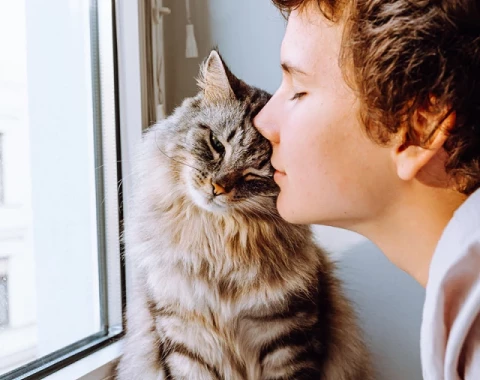FIV - Feline Immunodeficiency Virus
2024-01-11
Коти

Feline Immunodeficiency Virus (FIV) is a serious condition that can affect our furry friends. Although FIV is closely related to HIV, it is important to note that it does not transmit to humans. Also known as feline AIDS, this disease poses a significant threat to domestic cats, weakening their immune systems and leaving a lifelong impact on their health.
Transmission of the Virus
FIV can be detected in the saliva and blood of an infected cat, and the main route of transmission is contact of infected saliva during territorial fights of cats outdoors. Although it is possible for the virus to be transmitted from mother to offspring, this is rare. It is important to note that the virus does not persist in the environment for a long time, which minimizes the risk of transmission through everyday objects.
Effects of Feline AIDS
An infected cat becomes a carrier of the virus for life, and unfortunately, there is currently no effective treatment for FIV. The virus attacks various cells of the immune system, gradually weakening the body. Over time, an infected animal becomes more susceptible to various types of infections that would not pose a serious threat to a healthy cat.
Symptoms and Phases of Infection
The infection is often difficult to spot because the symptoms are varied and sometimes mild. Fever, malaise, loss of appetite - these are just some of the possible symptoms. There are different phases of the disease, ranging from an asymptomatic period to an advanced phase in which the immune system is significantly weakened, resulting in weight loss and susceptibility to serious infections.Diagnosis and Management
If you suspect a feline AIDS infection, it is important to consult your veterinarian immediately. Blood tests, including PCR tests, enable effective diagnosis. If the result is positive, regular check-ups are necessary, minimizing stress and focusing on prevention and control of secondary infections.
Prospects for the Infected Cat
An infected cat will carry the virus for the rest of its life. Despite the lack of treatment, the use of certain measures and principles, such as castration, can help to improve the animal's quality of life. Regular veterinary care, a low-stress environment, and effective prevention are key to maintaining a relatively good quality of life for an infected cat.Summary
Although feline AIDS has no cure, proper veterinary care, awareness of the symptoms, and effective prevention can greatly improve the outlook and quality of life of an infected cat. It is worth being aware of the risk of transmission and regularly monitoring your pet's health to ensure it lives as long and healthy as possible.
Transmission of the Virus
FIV can be detected in the saliva and blood of an infected cat, and the main route of transmission is contact of infected saliva during territorial fights of cats outdoors. Although it is possible for the virus to be transmitted from mother to offspring, this is rare. It is important to note that the virus does not persist in the environment for a long time, which minimizes the risk of transmission through everyday objects.
Effects of Feline AIDS
An infected cat becomes a carrier of the virus for life, and unfortunately, there is currently no effective treatment for FIV. The virus attacks various cells of the immune system, gradually weakening the body. Over time, an infected animal becomes more susceptible to various types of infections that would not pose a serious threat to a healthy cat.
Symptoms and Phases of Infection
The infection is often difficult to spot because the symptoms are varied and sometimes mild. Fever, malaise, loss of appetite - these are just some of the possible symptoms. There are different phases of the disease, ranging from an asymptomatic period to an advanced phase in which the immune system is significantly weakened, resulting in weight loss and susceptibility to serious infections.Diagnosis and Management
If you suspect a feline AIDS infection, it is important to consult your veterinarian immediately. Blood tests, including PCR tests, enable effective diagnosis. If the result is positive, regular check-ups are necessary, minimizing stress and focusing on prevention and control of secondary infections.
Prospects for the Infected Cat
An infected cat will carry the virus for the rest of its life. Despite the lack of treatment, the use of certain measures and principles, such as castration, can help to improve the animal's quality of life. Regular veterinary care, a low-stress environment, and effective prevention are key to maintaining a relatively good quality of life for an infected cat.Summary
Although feline AIDS has no cure, proper veterinary care, awareness of the symptoms, and effective prevention can greatly improve the outlook and quality of life of an infected cat. It is worth being aware of the risk of transmission and regularly monitoring your pet's health to ensure it lives as long and healthy as possible.
:
RaV




